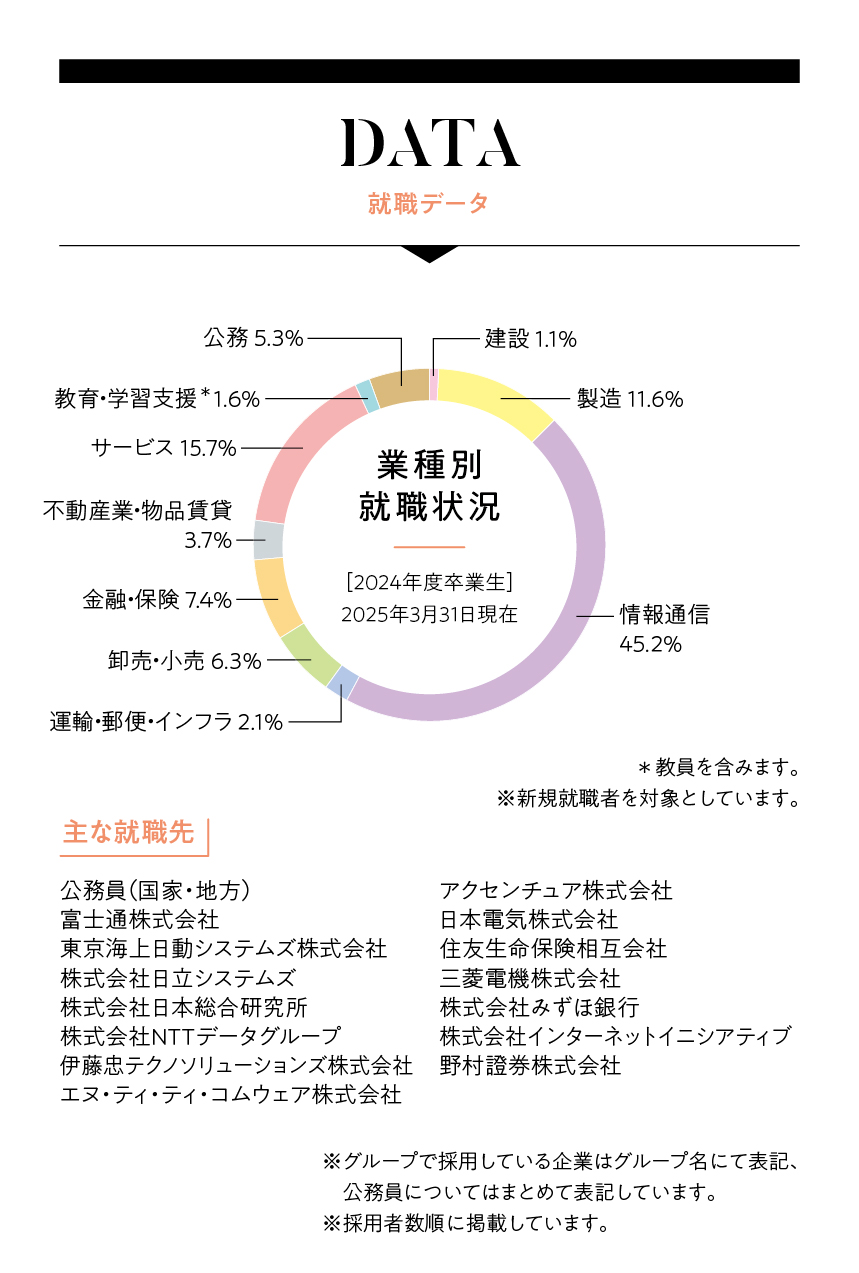- MENU -
FEATURES 社会情報学部の特色
あなたは文系ですか?理系ですか?誰もが悩み、迷います。
数学が得意で理系を選んだけれど心理学も学んでみたい。
英語が得意で文系を選んだけれど情報技術にも興味がある…
迷ったり決められないのは、実はあなたに好奇心が溢れているから。
社会情報学部は、文系理系の垣根をなくした「文理融合」をコンセプトにした「学びのるつぼ」で、皆さんの好奇心や可能性を限りなく広げます。
情報化社会の本質を探る4つの力
社会情報学部社会情報学科の学生は卒業までに、社会情報学の基礎とともに、社会科学、情報科学など各自の興味に応じた専門性を身につけていきます。
数理的な素養
技術が進歩しても色褪せない、あらゆる問題解決の基礎となる数理的素養
コミュニケーション能力
多様な人々・多様な分野をつなぐための語彙を駆使したコミュニケーション能力
論理的な思考
データ分析・プログラミングなど駆使した情報化社会における論理的思考力
情報の高度な応用
コンピュータを活用した問題解決のデザインを行うシステム思考力
「4つの力」をベースに、社会科学系、人間・コミュニケーション系・情報科学系の科目を組み合わせて学ぶことで将来目指す進路に必要な実践力が身につきます。
特色
多彩な分野を学ぶために、社会情報学部では、多彩な「学び方」も用意しています。
実社会の問題にチャレンジ プロジェクト学習
社会情報学部には、グループでプロジェクトに取り組む授業があります。大学を卒業して社会に出たとき、たいていの仕事は1人ではできません。ほとんどが、グループで協力して取り組む仕事です。授業では、グループワークの方法を、実際にプロジェクトに取り組むことを通して学びます。ビジネスマナー、発想法、集団問題解決といった基礎を学んだあと、プロジェクトを遂行し、成果をプレゼンテーションします。いわば、「創造的協調作業のつぼ」を会得することになります。この授業で行うプロジェクトは、実社会での、現実の問題に取り組むものです。たとえば、ソフトバンクと協働で、モバイルシステム活用の提案を行いました。また、神奈川県経済同友会の会員企業が提示した具体的な経営課題にチャレンジしたチームもあります(神奈川産学チャレンジプログラム)。これまでに、当時3年生のチームが最優秀賞を受賞するなど、大きな成果を上げています。
実践的な英語教育
徹底した英語教育を実現するために、英語の学習4技能(読む、書く、聞く、話す)を1年次の必修科目としています。教室内では、英語のみで進める(日本語禁止の)授業体制を実施。また、夏期英語リスニングトレーニング(任意参加)では、一般的に日本人にとって一番難しいとされている技能「聞く」「話す」を中心に集中的にトレーニングします。具体的には「聞く」技能は3段階(1.英語音を聞き取る、2.意味を理解する、3.聞き取ったことを覚えておく)の順序ですが、「聞く」の一番基礎になる英語の音を聞き取る練習をします。
2年次以降では、専門分野と直結した内容の英語プログラムを用意し、“使える英語”を学びます。また、海外留学や就職のためにTOEIC の高得点を取得できるようにする授業もあります。
文系のあなたも大丈夫 数学科目の学習
高校では「文系」だった人も、社会情報学部ではいくつかの数学の授業を履修することになります。授業の内容がよくわからなくて、不安になることもあるでしょう。でも大丈夫。個別指導型の数学質問部屋が開設されています。わからないところを質問すれば、納得のいくまでしっかりと教えてもらえます。
一方で、数学に興味のある人のために、多様な数理系科目が展開されています。経済や金融に必要な「数理ファイナンス」、情報科学に必要な「離散数学」、教員志望者を念頭に置いた「数の歴史」といった科目があります。
社会での強力な武器「統計学」を学ぶ
社会情報学部では「統計入門」を必修科目にしています。すべての学生が統計学の基礎をしっかりと学びます。情報のあふれた現代社会では、そうした情報を整理して有益な情報を得るために、統計学の知識が大いに役立ちます。すべての学生が統計学の素養を持って卒業していくことは、本学部の特色の一つです。授業では、スマートフォンを活用するなど、学習効果を高めるためのさまざまな工夫を行っています。統計入門を学んだあと、さらに統計学について詳しく学びたい人のために、関心のある方向に応じたいくつかの授業が用意されています。数理的な側面を強化したい人には、数理統計学の基礎を学ぶ「確率統計」という授業、社会調査などのアンケートデータの解析を学びたい人には「社会統計」、経済学および心理学でのデータ解析を学びたい人には「データ分析」、などの授業があります。「社会統計」と「データ分析」の授業には、演習のための科目がさらに用意されており、データ解析の技術を実践的に学ぶことができます。人を相手に実験データを取得するということを学びたい人には、「心理学演習」が用意されています。
先進的な情報教育
わが国で今後必要とされる高度IT人材の人材像と、その保有すべき能力を整理した共通の育成・評価のための枠組である共通キャリア・スキルフレームワークに準じた情報教育カリキュラムを編成いたしました。1年次では、学生はプログラミングの基礎を修得します。特徴として個人の技術修得だけではなく、グループによるプロジェクト演習とプレゼンテーションも行うことで、コミュニティ能力も同時に養います。2年次以降は、ネットワーク、セキュリティ、データベース、Webテクノロジなどインターネット社会において重要なIT技術だけではなく、システム管理、プロジェクトマネジメント、経営情報などのIT管理やIT経営戦略分野に関する高度な知識や技能も修得していきます。プログラミング科目はJava言語による入門科目からオブジェクト指向プログラミングやWebプログラミングまで取り揃えており、段階的に学習を進めることができます。さらにはソーシャルサービス、スマートフォンやタブレットなどモバイルネット社会の到来を見据えた最先端のテーマを積極的に取り入れています。
社会で必要な数理系教育
将来、ビジネス社会で国際的な活躍をするために必要な数学の知識、技術が身につくよう数理系教育を設計しました。現代では、統計学、定量分析、社会調査、マーケティングなど、多くの分野で数理的素養が求められています。高校までの数学の授業とは異なり、考えることのおもしろさ、現象を色々な方面から分析することの楽しさを学んでいきます。
社会情報学部では、多様な数理科目が学べるカリキュラムを提供しています。1、2年次には、基礎科目に加え、マーケティング、社会調査、心理分析等に必須の統計について学ぶ「統計入門」も配置し、3、4年次には、経済や金融に必要な「数理ファイナンス」、情報科学に必要な「離散数学」、教員志望者を念頭に置いた「数の歴史」など、多様な数理系科目を展開します。中学校教諭1種免許状(数学)、高等学校教諭1種免許状(数学・情報)も取得可能です。
フレッシュマン・オリエンテーション
社会情報学部のフレッシュマン・オリエンテーションでは、本学部の教育理念と授業内容についてのオリエンテーションが行われています。
初対面の学生や教職員が自己紹介、他己紹介などをしながら親睦を深めるイベント「リアルコミュニケーションツール・ビタハピ(Vitamin-Happy)」を導入しています。このビタハピは、社会情報学部が中心となって共同開発し、財団法人日本産業デザイン振興会の2008年度グッドデザイン賞を受賞しました。
ビタハピをきっかけに学生間に連帯感が生まれたり、友情を深めるきっかけにもなります。オリエンテーション後には学生、教職員間でいつも挨拶の絶えないキャンパスライフが待っています。
学会登壇・資格取得支援
社会情報学部では、学部での学びをより充実させるため、学会登壇や資格取得の支援を行っています。
学会登壇は、国内の学会に加えて国際学会での登壇も支援しています。(学会に所属するための入会費・年会費の補助も含みます。)
資格取得支援では、以下のような資格を指定し受験料補助等を行っています。
【対象資格一覧:日商簿記/証券アナリスト/証券外務二種(二種外務員資格試験)/アクチュアリー試験/ファイナンシャル・プランニング技能検定/世界遺産検定/統計検定/品質管理検定/社会調査士(キャンディデイト)/基本情報処理技術者試験/応用情報処理技術者試験/高度情報処理技術者試験(ITストラテジスト試験,システムアーキテクト試験,プロジェクトマネージャ試験,ネットワークスペシャリスト試験,データベーススペシャリスト試験,エンベデッドシステムスペシャリスト試験,ITサービスマネージャ試験,システム監査技術者試験)/情報処理安全確保支援士試験/CCNA (Cisco Certified Network Associate)/LPIC/ITパスポート/GRI認定サステナビリティ・プロフェッショナル(GRI Certified Sustainability Professional)/統計検定データサイエンス基礎・発展・エキスパート、データサイエンティスト検定リテラシーレベル/実用英語技能検定(英検)/TOEIC/TOEFL iBT/IELTS】
(※支援対象・範囲・基準等は別途定められ、年度によって異なる場合があります。詳細は入学後に確認してください。)
留学制度
本学では、海外の大学で学びたいという学生を支援するため、留学に関するサポートを国際交流センターで行っています。
休学せずに留学できる「在学留学」には、英語圏以外の国への協定校も広く用意されている「協定校留学」(派遣交換留学)と学生自身が留学を希望する大学を申請する「認定校留学」があります。また、夏期・春季休暇を利用した3週間ほどの、海外語学・文化研修も実施しています。
CAREER 就職
将来の進路例
・ 数理・情報に強い「金融アナリスト」
・ 組織に明るい「情報システムスペシャリスト」
・ タフで心豊かな「組織マネージャー」
・ 学習者心理・学習環境デザインに強い「数学・情報教員」
・ 経済・経営に精通した「ビジネスパーソン」
・ Webテクノロジを駆使できる新進気鋭の「ディレクター」
・ インターネットを核とした次世代ビジネスを創出できる国際派「プロデューサー」
主な内定企業・団体をご紹介します。
